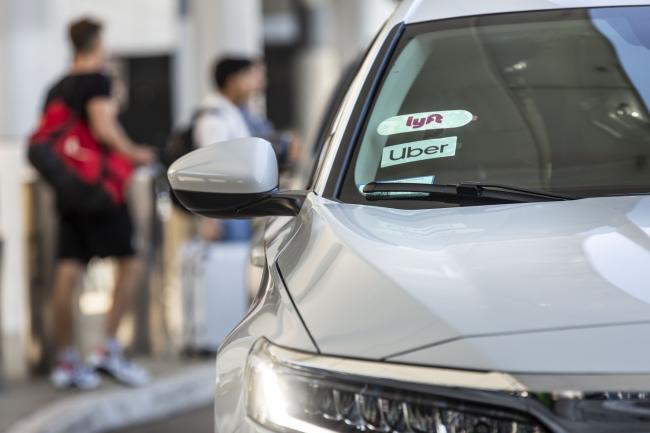(Bloomberg) -- Uber Technologies (NYSE:UBER) Inc. and Lyft Inc (NASDAQ:LYFT). were sued by California for allegedly violating a new state law designed to give gig-economy workers the benefits of employees.While expected, the lawsuit filed Tuesday in state court marks a serious threat to the business model of an array of companies that save on labor costs by classifying workers as independent contractors. If the companies ultimately lose the suit, they could be forced to pay for overtime, health care and other benefits.
The complaint “asserts that Uber and Lyft gain an unfair and unlawful competitive advantage by inappropriately classifying massive numbers of California drivers as independent contractors,” California Attorney General Xavier Becerra said during a virtual press conference. The cities of Los Angeles, San Francisco and San Diego joined the legal action, which was filed in San Francisco.
Shares of Uber and Lyft each fell more than 3.9% after the news, erasing most of their gains Tuesday.
“We are looking forward to working with the Attorney General and mayors across the state to bring all the benefits of California’s innovation economy to as many workers as possible, especially during this time when the creation of good jobs with access to affordable healthcare and other benefits is more important than ever,” Lyft said in a statement.
Uber said it will fight the lawsuit.
“At a time when California’s economy is in crisis with four million people out of work, we need to make it easier, not harder, for people to quickly start earning,” the company said in a statement. “We will contest this action in court, while at the same time pushing to raise the standard of independent work for drivers in California, including with guaranteed minimum earnings and new benefits.”
The lawsuit comes at a vulnerable time for the ride-hailing companies, which have been reeling from revenue losses caused by the coronavirus pandemic. The impact of shouldering the cost of worker benefits could be significant for the companies, with some analysts predicting as much as a 30% price increase. The exact cost may become more clear Wednesday and Thursday when Lyft and Uber report quarterly performance and discuss the coming quarter.
Signed by California Governor Gavin Newsom in September, the law known as Assembly Bill 5 took effect Jan. 1. It says workers can generally only be considered contractors if they perform duties outside the usual course of a company’s business. For Uber, that would mean arguing that driving isn’t the company’s usual course of business.
“When giant corporations like Uber and Lyft refuse to follow the law, we all pay the price,” California Labor Federation executive secretary-treasurer Art Pulaski said in an emailed statement. “When Uber and Lyft refuse to pay their fair share for unemployment insurance and other programs that are a lifeline to out-of-work drivers, taxpayers foot the bill while the bank accounts of the companies’ millionaire executives swell.”
Uber, the biggest of the gig-economy companies, has successfully fought numerous lawsuits over the years challenging its drivers’ status as contractors, settling some with modest payouts but without changing its business model. A.B. 5 gives California’s attorney general and city attorneys the ability to prosecute companies and block their operations if they’re found to be mis-classifying employees as contractors.
Because the suit is brought by the government and not by a private plaintiff, Uber and Lyft also can’t use any agreements signed by workers to shunt the dispute into arbitration.Public officials are more likely to get the courts to move quickly and unlikely to settle any cases without first demanding significant changes in how the companies do business, said Charlotte Garden, an associate law professor at Seattle University.
“This increases the likelihood that the key question -- whether drivers are employees under CA law -- finally gets resolved,” she said before the case was filed.
Uber saw the lawsuit coming. In December, it joined with another food delivery provider, Postmates Inc., in a preemptive lawsuit against California arguing A.B. 5 is unconstitutional because it singles out gig-economy companies and exempts some industries that rely on contractors. A judge rejected their request to temporarily block the law.
Uber and other gig firms have been bankrolling an effort to change A.B. 5 through a ballot measure, and have separately engaged in talks aimed at securing a deal with labor leaders and lawmakers to legislatively amend it.
Uber has made changes to its ride-hailing service in an effort to diminish the amount of control it exerts over drivers, which has traditionally been a key part of determining whether workers are employees or contractors.
(Updates with share prices in fourth paragraph.)
©2020 Bloomberg L.P.

